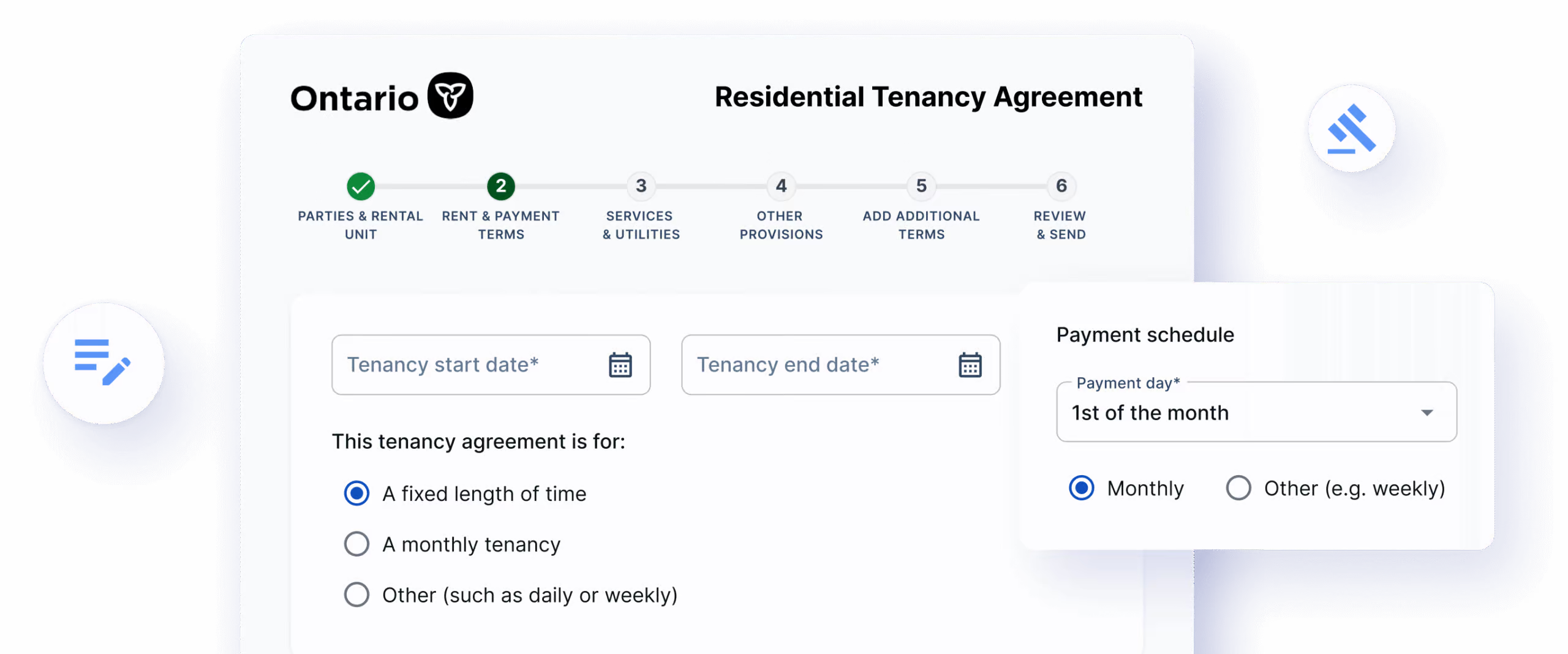- Ontario
- 8 Minute Read
Ontario 2025 Rent Increase Guidelines
Key Takeaways
- For Ontario, the rent increase guideline for 2025 is 2.5%. This figure is the maximum amount you can raise your rent, as long as it’s been 12 months since your last rent hike or 12 months have passed since your tenant has moved in.
- You must notify your tenant of an upcoming rent increase at least 90 days before it takes effect using the proper form. In most cases, this will be form N1: Notice of Rent Increase.
- The Ontario rent increase guideline doesn't apply to select properties, including long-term care homes, vacant units, and community housing units. Under certain circumstances, the Landlord and Tenant Board (LTB) may exempt you from the guideline, allowing you to increase your rent by more than the annual limit.
Updated on Aug 26, 2025
Written By:
Verified By:

Ontario’s Landlord and Tenant Board (LTB) has released the annual rent increase guideline for 2025. If you’re a landlord planning on increasing your rent, knowing how high you can set your new price is essential to staying compliant with the law and setting expectations for your tenant.
In this guide, we’ll cover everything you need to know about the new guideline, including the maximum rent increase allowed for 2025, the types of properties it applies to, and situations where you can raise your rent by more than the legal limit. We’ll also explain how and when you must notify your tenant of a rent increase.
2025 updates to Ontario’s rent increase guideline
The rent increase guideline in Ontario for 2025 is 2.5%. In other words, 2.5% is the maximum you can raise your tenant’s rent during the year. For example, if you rent a property for $1,500 monthly, you can increase the price to $1,537.50. If you’d like to increase your rent higher than this limit, you’ll need to obtain approval from the LTB.
In most cases, you can increase the rent price for a residential property 12 months after:
- The last rent increase
- The start date of the tenancy
As the landlord or property owner, you must provide your tenant with 90 days written notice using the appropriate form before it takes effect.
What properties does the Ontario rent increase guideline affect?
The 2025 rent increase guideline applies to most residential rental properties outlined in the Residential Tenancies Act, 2006, (RTA) including:
- Rented houses
- Apartments
- Basement apartments
- Condos
- Care homes
- Mobile homes
- Land lease communities
The rent increase guideline doesn’t apply to:
- Vacant residential units
- Community housing units
- Long-term care homes
- Commercial properties
- Subsidized housing (different rent control rules govern these property types)
2025 rent increase exceptions
In some cases, you can apply to the LTB to raise your rent more than the allowable amount under the rent increase guideline. According to Tribunals Ontario, here are the instances in which you can request an exemption:
- Your municipal taxes and charges have increased by an “extraordinary amount.”
- You performed significant renovations, repairs, replacements, or added new additions to your property.
- You faced a substantial increase in security expenses.
Some exceptions to the Ontario rent increase guideline apply automatically.
For example, the guideline pertains only to the rent portion of care homes, not to the costs associated with services like nursing, food, and cleaning. As a result, you could raise the fees associated with delivering such services as high as you deem reasonable, even if they exceed the guideline when combined with the rent fee.
There’s also an exemption for new buildings, additions to existing buildings, and new basement suites occupied for the first time after November 15, 2018. To avoid legal disputes related to the residential occupancy date, keep relevant records as proof. Some examples are building permits, occupancy permits, and home warranty documents.
How to raise rents in Ontario
Are you thinking about raising rent for your Ontario property in 2025? Here’s how to do it:
Step 1: Determine your new rent price
Take some time to determine a suitable rent price. You’ll want to consider average rental prices in your area for units similar to yours, increases in your operating costs, and what renters would be willing to pay. Striking the right balance between these variables is critical to ensure your rental generates a healthy profit margin while remaining attractive to tenants.
Choose something fair and reasonable based on your property’s value, market demand, and other relevant factors.
Step 2: Complete the required form
In Ontario, you must supply your tenant with specific documentation whenever you raise your rent. Depending on your property type and the nature of the tenancy, you’ll need to fill out one of the following forms:
- N1 Notice of Rent Increase with instructions
- N2 Notice of Rent Increase (Unit Partially Exempt) with instructions
- N3 Notice to increase the rent and/or Charges for care service and meals with instructions
- N10 Agreement to Increase Rent Above the Guideline with instructions
Step 3: Notify your tenant of the upcoming rent increase
Under Ontario’s residential tenancy law, you must give your tenant at least 90 days notice of an impending rate increase.
Send your tenant the appropriate form and any other supporting documentation that provides further details about the upcoming rent hike. They must receive the documents on time, so it’s best to deliver them personally or use registered mail. You can also serve the notice through email. It’s always a good idea to follow up with the tenant to ensure they’ve received it.
Resolving issues about rent control
Contact the LTB to determine whether your rental unit is eligible for an exemption under the rent increase guideline. To improve your chances of qualifying, include an additional term under section 15 of the lease agreement, stating that the property is exempt from the rent increase limit. Make sure to retain all records to support your case.

Screen applicants thoroughly with credit, background, and income verification—so you reduce risk, avoid surprises, and protect your rental income.
How Does Rent Control Work in Ontario?
Rent control in Ontario is a system that limits how much landlords can raise rent each year. It is meant to protect tenants from sudden, unfair increases. The rules are tied to the Ontario guideline rent increase, which is updated every year by the provincial government.
For 2025, the Ontario rent increase guideline 2025 percentage applies to most private rental homes, apartments, and condos. Landlords must follow this limit unless they qualify for an exemption.
When Rent Control Applies
- Most units built before November 15, 2018, are covered by rent control.
- Rent increases must match the guideline set for the year.
- Tenants must receive 90 days’ written notice before the change.
Exceptions to the Rules
Some units are not covered by rent control. This includes newer rental buildings, vacant units, and some special housing. In those cases, landlords can set higher rent once a new lease starts.
Importance of Agreements
Clear paperwork protects both sides. Documents like the Ontario residential tenancy agreement 2025 and the Ontario lease agreement 2025 outline rights and obligations. These agreements work alongside rent control laws to keep the rental market stable and fair for everyone.
Tips for Tenants and Landlords
The Ontario rent increase guideline 2025 Ontario government affects everyone in the rental market. Tenants and landlords can prepare by planning ahead and following best practices.
Budgeting Advice for Tenants
Tenants should review their monthly expenses before the rent increase takes effect. Even a small raise can impact savings or daily needs.
- Track monthly spending and look for areas to cut back.
- Build an emergency fund to cover unexpected housing costs.
- Review your Ontario rental application 2025 or lease terms to confirm when increases apply.
- Ask your landlord for written notice and keep copies for your records.
Taking these steps can make the increase easier to manage and reduce stress.
Legal Compliance Tips for Landlords
Landlords must follow the rules in the Ontario rent increase guideline 2025 Ontario government. This keeps increases legal and avoids tenant disputes.
- Provide tenants with at least 90 days’ written notice.
- Use the correct rent increase form Ontario 2025.
- Make sure the increase matches the official guideline percentage.
- Keep clear records of notices and lease agreements.
Landlords should also review the Ontario lease agreement 2025 to ensure it meets current requirements. Staying compliant protects your investment and builds trust with tenants.
Our Final Thoughts
The maximum allowable rent increase in Ontario for 2025 is 2.5%, which applies to most residential rental properties in the province.
As a landlord, you must follow the proper procedures to raise rent. This means giving tenants at least 90 days’ notice using the correct form. Rent can only be increased if 12 months have passed since the last increase or the start of a new tenancy.
Some properties are exempt from the guideline, such as commercial properties, vacant units, and long-term care homes. In certain cases, landlords can also request approval from the Landlord and Tenant Board (LTB) to raise rent beyond the set limit.
For full details, review the Ontario 2025 rent increase guideline on the official Government of Ontario website.
Need Help With Rent Rules?
- Browse our Ontario rental documents page to find the forms you need.
- Stay updated with new guidelines to protect your rental agreements.
- Book a quick chat with us through Calendly for advice tailored to your situation.
Stay ahead, protect your rights, and make rental management in 2025 easier and stress-free.
Frequently Asked Questions About Ontario Rent Increase 2025
What is the rental increase for 2025 in Ontario? The Ontario rent increase for 2025 is capped at 2.5%. This percentage is set by the Ontario government and applies to most residential rental properties across the province. The Ontario rent increase guideline 2025 ensures fairness by limiting how much landlords can raise rent each year.
Can a landlord increase rent by 5.5 percent in Ontario? No, a landlord cannot raise rent by 5.5% in Ontario without approval. The legal rent increase Ontario 2025 is limited to 2.5%. If a landlord wants to raise rent above the guideline, they must apply to the Landlord and Tenant Board (LTB) and provide valid reasons, such as high repair or maintenance costs.
What is the maximum rent increase in 2025? The maximum rent increase Ontario 2025 is 2.5%. This applies to most rental units covered under rent control laws. Some newer buildings, vacant units, and exempt properties may not follow this limit, but the majority of tenants in Ontario are protected by the guideline.
How much does rent go up every year in Ontario? The amount rent goes up each year depends on the Ontario rent increase guideline, which changes annually. For 2025, the increase is set at 2.5%. In past years, the percentage has varied based on inflation and government policy. Checking the guideline every year ensures tenants and landlords stay compliant.
Learn more about resources in Ontario
Learn more about Rent Increase Guidelines
- How Much Can a Landlord Raise the Rent in Alberta in 2025
- British Columbia 2025 Rent Increase Guidelines
- Manitoba 2025 Rent Increase Guidelines
- New Brunswick 2025 Rent Increase Guidelines
- Newfoundland and Labrador 2025 Rent Increase Guidelines
- Northwest Territories 2025 Rent Increase Guidelines
- Nova Scotia 2025 Rent Increase Guidelines
- Nunavut 2025 Rent Increase Guidelines
- Ontario 2025 Rent Increase Guidelines
- Prince Edward Island 2025 Rent Increase Guidelines
- Quebec 2025 Rent Increase Guidelines
- Saskatchewan 2025 Rent Increase Guidelines
- Yukon 2025 Rent Increase Guidelines


